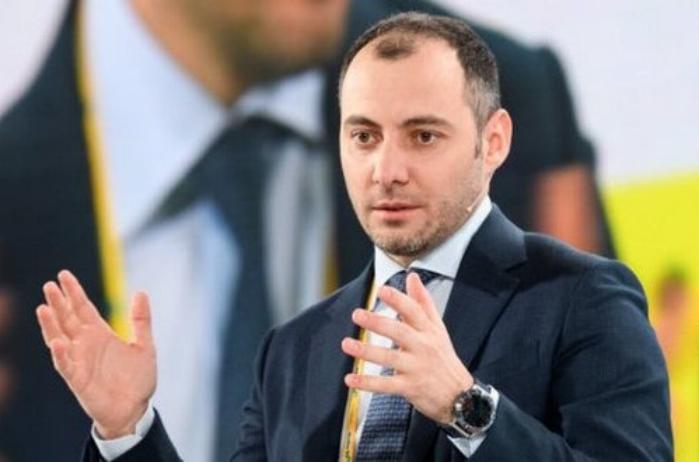Western partners disappointed by Kubrakov and Nayem sackings and losing confidence in Ukraine's government - FT
A series of Zelenskyy-directed resignations in recent months have sparked tensions between Kyiv and Western countries that fund defence programmes

Ukraine's government has lost two senior officials responsible for infrastructure, economic recovery and defence fortifications in a month. Western countries have not received any explanation for the dismissal of Infrastructure Minister Oleksandr Kubrakov and the head of the State Agency for Infrastructure Recovery and Development Mustafa Nayem, with whom they had been closely cooperating.
Source. The Financial Times reports.
"The US and other Western partners want normal, predictable relations with their Ukrainian counterparts. And now they are losing confidence in the Ukrainian government because of personnel decisions they don't understand,’ a Ukrainian official concerned about the situation told the Financial Times.
A series of resignations, dismissals and cabinet reshuffles at the behest of Volodymyr Zelenskyy in recent months have caused tensions between Kyiv and Western countries that fund defence and reconstruction programmes, six Western and Ukrainian officials told the newspaper.
All six sources warned the president and his government of what they saw as the devastating consequences of such unexplained moves.
Kubrakov, who had worked closely with US officials, was dismissed without explanation a month ago.
And on Monday, Mustafa Nayyem resigned, saying that Prime Minister Denys Shmyhal had banned him from attending a conference on Ukraine's recovery, which is to take place on 11-12 June in Berlin. The conference is to discuss with donors projects to reconstruct cities, energy and other infrastructure destroyed by Russian strikes.
The FT has obtained a letter from Shmyhal to Nayyem, which reads: ‘I agree with your business trip to Berlin’, but with a handwritten ‘I do not agree’ on top, and a handwritten ‘not’ inserted before ‘I agree’ and underlined. The letter signed by Shmyhal is dated 7 June, and a government source confirmed its authenticity to the FT.
Nayyem said on Facebook that he was leaving ‘due to systemic obstacles that prevent him from effectively performing his duties’. According to him, since November 2023, the agency has faced ‘resistance and artificial obstacles... the budget for road rehabilitation and maintenance projects has been completely cancelled.’
Nayyem also complained that ‘documents for the payment of protective structures, fortifications or their restoration were agreed with the government for months, returned six to eight times with absurd remarks, postponed for several months, and some have not been signed yet.’
It was in November, after the failure of last year's counter-offensive, that Zelenskyy discussed with the army leadership the need to build defences. In December, he publicly announced that this would be done.
But Shmyhal only announced the allocation of more than 30 billion hryvnias (over $800 million) in February.
The military on the front line complained that the fortifications were not ready for the Russian invasion that began in May.
Zelenskyy will attend the conference in Berlin, but experts say the absence of the government's top expert in the field will be poorly received by Western countries.
‘In fact, this is a message to our partners that recovery is no longer a priority,’ says Hlib Vyshlinsky, executive director of Kyiv's Centre for Economic Strategy.
Kubrakov requested the hiring of the agency, and the unexplained dismissal of the minister has provoked a strongly negative reaction from Westerners, who have shown it both publicly and privately, six sources told the FT.
According to two Ukrainian officials, Zelenskyy and his office began to believe that Kubrakov had become too close to US officials.
The Washington Post recently wrote about the same issue, noting that U.S. officials are worried that reformers in the government who have fought corruption and were seen as particularly close to Washington are being targeted.
Two diplomats told the FT that the US, German, French and EU ambassadors agreed to show support for Kubrakov after his resignation by tweeting photos of themselves with him on 9 May (X) and thanking him for their work together.
A meeting with Shmygal on 13 May, which was supposed to discuss the energy situation, turned into a heated debate over the fate of Kubrakov and Nayyem, who was supposed to attend but was excluded at the last minute, three officials told the FT.
"The ambassadors asked directly why Mustafa and his agency were not at the meeting. The German ambassador, the EU deputy representative and the US ambassador were the most indignant,’ one of them said.
"This is a very bad situation in terms of the perception of the Ukrainian government and Ukraine in general. Ukraine is perceived and should be perceived as a whole. The resignations of Kubrakov and Nayyem have created an image of a weak and unpredictable governance system,’ Vyshlinsky said.
If you have read this article to the end, we hope that means it was useful for you.
We work to ensure that our journalistic and analytical work is of high quality, and we strive to perform it as competently as possible. This also requires financial independence. Support us for only UAH 196 per month.
Become a Mind subscriber for just USD 5 per month and support the development of independent business journalism!
You can unsubscribe at any time in your LIQPAY account or by sending us an email: [email protected]



